|
|
The post is a followup to WP Rocket’s Transparency Report – Why You Shouldn’t Offer Lifetime Licenses. The reason I was so intrigued by the title is because I was planning to write an opinion post explaining Why Lifetime License is Great for your WordPress Plugins Business.
After reading the reasoning, I realized that my perception of a lifetime license is very different than the lifetime license WP Rocket or many of the other WordPress plugin businesses are offering. I was actually very surprised, even in shock, learning how much money WordPress plugin developers are leaving on the table with their so-called, “lifetime license”.
The first time I heard about the concept of a lifetime license was in early 2012. I was visiting WalkMe’s offices in Tel-Aviv to meet with a fellow entrepreneur, Rafi Sweary, the President and co-founder of WalkMe (amazing company btw). We were discussing marketing and pricing, and one of the things I noticed was the lifetime plan they had on their pricing page. When I asked Rafi about it, his answer was straightforward:
“Most of the websites don’t last for over 3 years, so if I can take their money for the whole period ahead, why wouldn’t I?”
The main difference between Rafi’s lifetime license and the WP Rocket license is the concept of the limit. No one said that lifetime equates to unlimited. In fact, WordPress is one of the very few ecosystems that has an unlimited license concept.
WordPress is one of the very few ecosystems that has unlimited license concept.
Why was the unlimited license adopted by the WordPress economy?
My guess is that it has started because many of the WordPress businesses that sell plugins are actually agencies. The root of the unlimited license came as the “dream license” that the developers in the agency would have wanted to have themselves. It’s just my theory, but it makes a lot of sense.
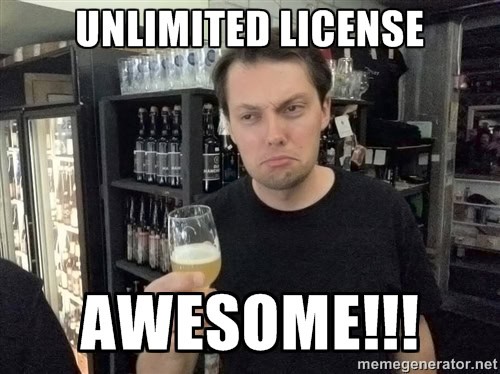
I just imagine the discussion of the agency guys thinking about the pricing while sipping cold bottled beer at the end of a long workday – “Hey man, wouldn’t it be great if we can pay for a plugin once, and then get unlimited support, implement it for an unlimited amount of clients? Dude, that’s awesome! And let’s make it forever!”. Sounds great for agencies – sounds horrific for plugin businesses. I don’t know how it happened, but somehow this license was adopted by the community. Insane!
Getting back to the transparency report, I absolutely agree with the WP Rocket team, lifetime license for unlimited sites is a huge mistake. It involves too many risks, and it’s a direct way to unsustainable business. If you don’t proportionally align the revenues to your expenses, you simply can’t build a profit equation nor solid business plan – the math just doesn’t work that way.
Why is a lifetime license great?
By removing the unlimited part from a license and swapping the “sites” with “domains”, Lifetime licenses can be a great bump to the LTV (lifetime value) and the bottom line of a business.
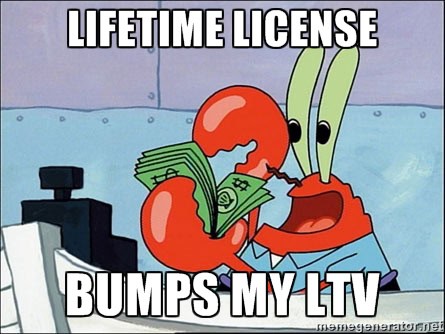
To understand why, and how to make it worthwhile for your business, we first have to understand how to price it.
How much should you charge for a lifetime license?
Rafi’s explanation was based on intuition and many years of experience working with the world wide web. To prove it, I will provide you with some analysis based on research and public data. But before we start, we have to agree on one fact. The vast majority of the transactions in the WordPress plugins economy are generated by small businesses. This category also includes agencies, and freelancers, which are a one-man show business.
Now it’s data time!
What is the Lifespan of a small business?
Based on data published by the Bureau of Labor Statistics, only 44% of small businesses stay in business for four years.
Conclusion #1 Half of your plugin’s customers vanish after four years.
Half of your WordPress plugin’s customers vanish after four years.
What is the Lifespan of a website?
In 1997, Brewster Kahle, the founder of The Internet Archive, found that the average lifespan of a web page is 44 days. Based on an academic study in IEEE Computer in 2001, Alexa, an Internet analytics company, estimated that the “rate of decay” for web pages is about 75 days. In 2003, a Washington Post article indicated that the number was 100 days. This article has many references online, but the original post has vanished from the web – another proof that links don’t last forever 🙂 Therefore, I think it’s safe to state that the average website’s lifespan is not longer than five years.
The average website’s lifespan is not longer than five years.
Conclusion #2 If you base your license on a domain, the average customer will not be able to renew your plugin’s license on the 5th year since the site won’t be there anymore.
I’m not saying that you need to be an asshole and require a new license purchase when a business decides to change its domain. The domain limitation should protect you from a customer buying a lifetime license and then recycling it with ten different companies/domains. If you wonder how this could happen, here’s a realistic use case. An agency purchases a 100-site lifetime license. As we have learned, most businesses vanish after four years, so the agency can reuse the licenses of post-mortal clients and never pay you another dime.
What are the chances a customer will renew a license 4 times in a row?
Now let’s analyze annual renewal rates. Assuming your renewal rate is 50% (which is a very good rate for plugins). The chance that a customer will renew the license for the 2nd time is 25%, and 12.5% for the 3rd time. And only 6.25% for the 5th year.
If your plugin’s renewal rate is 50%, only 6 out of 100 customers will renew the license four years in a row.
Conclusion
Looking at these numbers, the chance to keep having a customer paying you for 5 years in a row is pretty damn low. The customer’s business need to survive 5 years, the domain needs to remain with the same site and you need to get that customer to keep renewing year, after year, after year, after year 🙂 btw don’t forget that your plugins business also needs to survive these 5 years.
The chance to keep having a customer paying you for the same WordPress plugin 5 years in a row is pretty damn low.
Therefore, if we manage to convince a customer to pay for a 5-year license in advance, we maximize the number of dollars we could get from that customer, and the chance that the license will be utilized for the whole 5 years or more is extremely low. I hope you understand where I’m heading to… if you charge for a lifetime license at 5 times your annual price – you are pretty much covered.
![]()
Tip: Personally, I recommend pricing it as a three to four year license, to incentivize the upgrade with a decent discount.
Grab a free copy of our Cheat Sheet for
Selling Plugins and Themes
A growth roadmap with concise, actionable tips for every milestone of WordPress product development.

How much should you charge for a N-domain lifetime license?
Now it’s time to do some math, but don’t worry–it’s not too complex. One way to do your bulk pricing is just to charge N times the annual lifetime license. Even add some proportional reward (extra discount). Something like:
![]()
If the user purchases a 10-domain license, they pay only for 8 (or gets a 20% discount). If the user purchases a license for 20-domains, they pays only for 16… So as the N variable gets bigger the customer saves more money.
The coefficient doesn’t have to be linear. Here’s the equation we use for our plugin, RatingWidget:
![]()
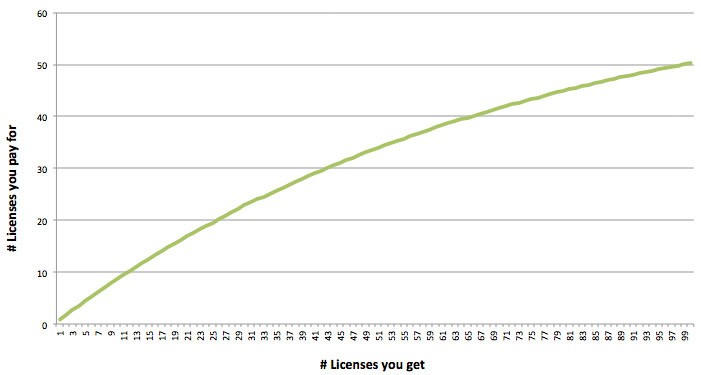
When the coefficient is not linear, you have to make sure that the price actually always goes up. To prevent loopholes where it’s cheaper to buy a M-domain license than N-domain license, when M > N. Therefore, we defined the pricing with a recursive equation. By definition, as the N is larger, the price will be higher.
How to work the lifetime license for agencies?
When an agency is scouting for a new plugin for their toolbox, one of the factors that is being evaluated is the price – “how much money do I save if I purchase plugin-X vs. plugin-Y vs. plugin-Z?”
What if there was a plugin-$ that could generate extra revenues for the agency instead of only saving costs? “That’s awesome, and let’s make it forever.” Sound familiar? But how can we magically generate money for the agency?
We don’t!
It’s all about psychology and marketing. Remember the lifetime license equation from the previous part–the one with the 20% discount. What if instead of marketing a “20% discount” you have the following agency offer:
“We give all your customers exclusive 10% discount for our plugin! In addition, you get 10% of the revenues for the 1st year.”
It’s a simple win-win. The agency is a hero for getting an exclusive discount for their customers, plus they make money for being your champion. As more of their customers will use your plugin the more money they make. And for you, it’s still the same 20% discount, just a rehash.
When you offer an unlimited license, the incentives are not aligned amongst the agency and the plugin business. As the plugin author, you want to minimize the number of sites that will be (ab-)used with the agency’s license, while the agency doesn’t really care.
With the “we make money – you make money” approach, it’s in the interest of the agency to push your plugin to as many clients as possible and it’s also your interest since you make money for every additional license. Pst… I’ll tell you a secret – it’s called affiliation, and it’s working great!
At Freemius we support monthly, annual, and lifetime plans out of the box (the right lifetime), and we encourage the developers we work with to utilize them all to maximize revenues. We support single domain and multi-domain lifetime licenses.
I’m sure many of you have lots of opinions on the topic – so spill it in the comments.






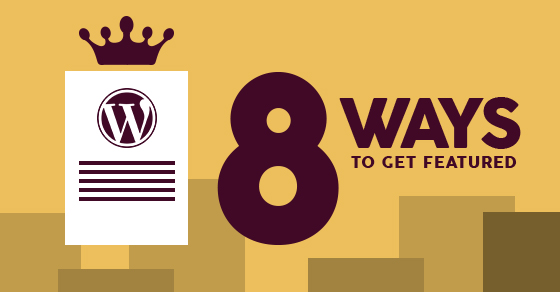
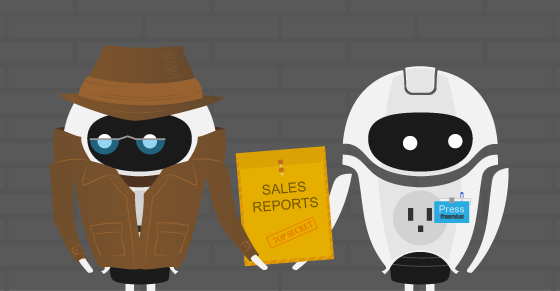

Good article. I feel like I got useful insight from your drill-down on lifetime licenses. Another point in relation to the 3-5 year horizon, is that 3-5 years is about the time frame for rewriting or redesigning your website ... if it is still going strong.
As you point out, customers are often individuals or small businesses with a lot of uncertainty. Loading up on recurring fees is scary. You can likewise flip that around for the plugin authors, many of whom are also small concerns. One thing I've seem that mitigates the risk for the plugin providers is to separate support from updates. For example, offering a lifetime license with 1 year of support, and additional support at a reasonable fee. Providing updates is a lesser cost than providing support forever.
Lifetime license with time-limited support is a very interesting concept. Do you remember the plugin/s that use that approach?
Backupbuddy gold
Formidable Pro also does this. Though they also limit the automatic update functionality if you don't have an active subscription. You can get updates for life, but without a subscription, you have to do the update manually instead of through the Wordpress dashboard.
Hi, its really a awesome guide. Now i will definitely go for the lifetime license.
Thanks Again
I have a doubt. Is it legal to restrict the use of GPL code to one particular domain?
Of course it is legal.
From the preamble of the GPL
"When we speak of free software, we are referring to freedom, not price. Our General Public Licenses are designed to make sure that you have the freedom to distribute copies of free software (and charge for them if you wish), that you receive source code or can get it if you want it, that you can change the software or use pieces of it in new free programs, and that you know you can do these things."
As everything is PHP the source code is distributed, and you have the right under GPL to modify the code i.e. 'null' the licence processing - of course that would also automatically 'null' the access to support and updates.
I got an issue with the reviewer on WordPress.org because of the GPL. They said that we're selling themes on our website with restrictions to one domain which is against GPL policy.
What can we do about it?
All you can do is respond professionally, explaining that GPL does not mean free as in pay nothing, it means free as in you are free to copy and modify.
Also I'm not sure if you dual licence your themes, but in terms of WordPress only PHP code has be be GPL, as it is derivative work, you can licence images, CSS and JavaScript javascript as you like.
Good analysis of the pros of lifetime licensing from the vendor's perspective. From a consumer's point of view, life time access is extremely tempting, and I'll be the first to admit I've taken the plunge many a times. In more than half of those instances, I could have saved money by purchasing an annual access instead actually, as I stopped using the plugin or product after that.